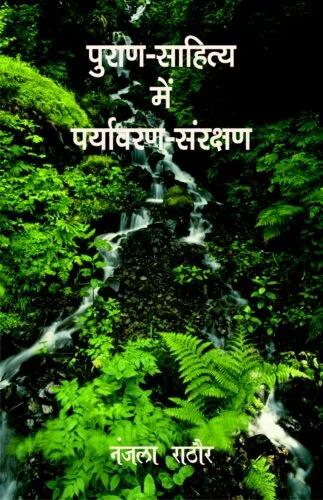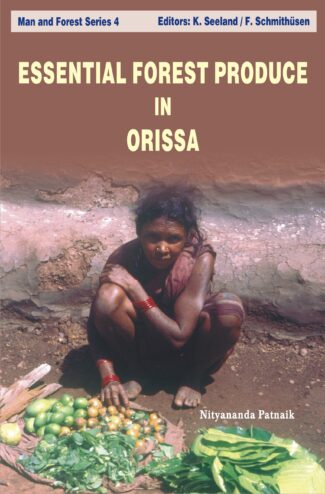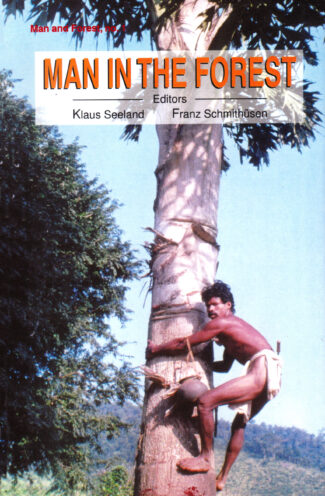

Purana Sahitya mein ...
Purana Sahitya mein Paryavaran Samrakshan
Environmental Protection in Pauranic Literature by: Nanjala RathoreHow important was environment in the ancient times as depicted in the Puranic literatures has been discussed in detail in this book.
₹300.00 Original price was: ₹300.00.₹270.00Current price is: ₹270.00.
ISBN: 9788186921180
Year Of Publication: 2001
Edition: 1st
Pages : xiv, 194
Bibliographic Details : Bibliography
Language : Hindi
Binding : Hardcover
Publisher: Decent Books
Size: 23 cm.
Weight: 450
How important was environment in the ancient times as depicted in the Puranic literatures has been discussed in detail in this book.

- Sale!Essential Forest Produce in Orissa by: Nityananda Patnaik
₹450.00Original price was: ₹450.00.₹405.00Current price is: ₹405.00.This volume is the 4th in the ongoing Man and Forest series a series trying to highlight the relevance of indigenous knowledge of various tribal communities in the sustainable management of forests and local resources more specially against the growing challenges of economic development vis-à-vis environmental hazards and a declining resource base. Orissas forests, covering a little over 57,000 sq km (or 36.72% of the states geographical area), are known to have a profusion of minor forest produce (MFP) which has been upgraded due to its importance for tribal livelihood and is called Essential Forest Produce (EFP) through the book. It comprises simple fodder and fuelwood to baffling medicinal herbs, besides numerous economically important plants yielding dyes, tannin, fibres, flosses, essential oils, edible fruits, seeds, leaves, honey among many other items. Yet, despite its enormous economic potential, about three-fourths of this forest wealth has so far been unutilized by the tribal communities largely because of its inaccessibility. With a holistic product profile of Orissas forests, an eminent anthropologist here looks for the rationale behind the vastly deficient utilization of its EFP identifying the entire range of causes: from the tribals incapacity to reach this forest resource to their exploitation by middlemen/traders/moneylenders to the larger forest policy issues. Dr Patnaik also proposes measures which would help tribals not only to actualize the inherent potential of EFP but, in turn, strengthen their economy as well. It is a painstaking empirical study of interest to social anthropologists, environmental activists, foresters, development economists, forest resource economists planners and policy-makers.
- Sale!Forest Tribes of Orissa Vol. 1: Dongaria Kondh Forest by: Mihir K. Jena, Padmini Pathi, Jagannath Dash, Kamala K. Patnaik, Klaus Seeland,
₹1,650.00Original price was: ₹1,650.00.₹1,485.00Current price is: ₹1,485.00.In the management of renewable resources, forests have undeniably a vital role and today, as never before, their conservation is an urgency. In view of this dire necessity, the series Man and Forest tries to highlight the relevance of indigenous knowledge of various South Asian tribal communities in the sustainable management of forests/local resources more specially against the growing challenges of economic development vis-a-vis environmental hazards and a rapidly declining resource base. A scientific inquiry into indigenous knowledge is an effort to discover/ rediscover the tribals traditional modes of production and conservation. For them it is the only source to cope with the problems of modernity affecting their lives and precarious environments. Forest Tribes of Orissa: The Dongaria Kondh is the second book in the series of monographs of Man and Forest, and the first focussing on a tribal community today caught in the transition between an autochthonous lifestyle and fragments of modernity. The authors attempt to document the Dongarias traditional knowledge of their natural environment; how they classify trees, plants, hills, forests, crops, and soils; and how so far they have been managing their forests. Also meticulously delineated, as a backdrop to this study, are the Dongarias geographical landscape, economy, socio-political organisation, oral traditions, belief cosmos, and other relevant socio-cultural aspects. The present book is, as most of the volumes in the series, the outcome of nearly ten-years research venture involving an interdisciplinary, intercultural team of sociologists, ethnobotanists, social anthropologists and other social scientists.
- Sale!Economics and Nature by: Navin Doshi
₹600.00Original price was: ₹600.00.₹540.00Current price is: ₹540.00.The book, adopting a fresh approach, addresses the economic travails in the contemporary global scenario and presents a search for solutions to the economic quagmire based on arguments relying on common sense and understanding of human nature. It analyses the views of thinkers and economists including Kautilya of the ancient India, ideas of John Maynard Keynes and Milton Friedman, and other highly acclaimed economic theories to discuss ideal economic concepts. Looking at the past for economic wisdom and taking clue from the laws of nature which ensures that imbalances do not persist for long, the articles in the volume deal with matters of deep concern in the present-day global economic scenario and ways to address them. The volume, informative, interesting and insightful, is bound to be useful to economists as well as general readers.
- Sale!Man in the Forest by: Klaus Seeland, Franz Schmithusen,
₹450.00Original price was: ₹450.00.₹405.00Current price is: ₹405.00.In the management of renewable resources, forests have undeniably a vital role. And today, more than ever before, their conservation is an urgency. In view of this dire necessity, Man in the Forest tries to highlight the high relevance of indigenous knowledge of Indian tribal communities in the sustainable management of forests/local resources more specially against the growing challenges of economic development vis-a-vis environmental hazards and a declining resource base. A scientific inquiry into the area of indigenous knowledge is basically an effort to discover/rediscover (in the tribals traditional modes of production and conservation) appropriate means to cope with the problems of modernity affecting largely the lives of the poor: not only in precarious environments, but amidst fast-depleting local resources as well. Essentially a selection of papers: based on cross-cultural, interdisciplinary investigations, the book takes a critical look at both the ascribed benefits and limitations of indigenous knowledge in general, and with regard to forest management by local tribal people in particular. Also including, contextually, an overview of the various aspects of forests lifestyles, forest use, and management of natural resources in different climatic and cultural zones on the subcontinent, the authors emphasize the social meaning of forests as a cultural legacy with case studies from different regions of India, namely, Arunachal Pradesh, Himachal Pradesh, Karnataka, Madhya Pradesh, Orissa, Rajasthan, and Uttar Pradesh. It is the first volume in the the newly-launched series about Man and Forest in South Asia, putting together research findings that represent accounts of experience and empirical evidence in the fields of forest management, social anthropology, ethno-botany, economy, forest policy and cultural history.
- Sale!Human Ecology in the Vedas by: Marta Vannucci
₹1,200.00Original price was: ₹1,200.00.₹1,080.00Current price is: ₹1,080.00.Directing his view towards the whole universe holistically, amazingly, the Rigvedic man as this study shows was awakened to the cosmic Law and Order (Rita); he saw how nothing: nature, environment, or the universe itself, was ever static; and how the orderly Energy was at the root of all changes and movements. Instinctively, he not only bowed down to the Order that reigns supreme, but also tried to attune himself, his behaviour, and his everyday activity to the eternal laws of the universe. Which, says the author, he recognized as his dharma. A sequel to her earlier, well-received title: Ecological Readings in the Veda, Dr. Marta Vannuccis this book sets out fresh, insightful analyses of the Vedic writings to highlight the ancient rishis perceptions of the Universe, Nature, and cause-effect relationships; and how, millennia ago, these sages came to revere, even adore, Nature in its different manifestations and, wittingly or unwittingly, evolve an environmentally friendly culture. In support of her findings, the author also analyses a few selected hymns from the Rigveda, using a biological key to decode these songs. Additionally, she also explores some important aspects of two Vedic gods: Indra and Varuna, who respectively represent the material and immaterial reality. Highly relevant appendices apart, the book includes a comprehensive glossary of Sanskrit/non-English words and numerous bibliographic references.









